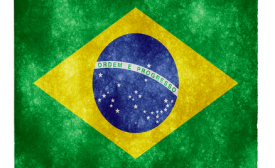2016 Rio Olympics
Did the World Cup improve or damage Brazil's reputation on the international stage?
Sunday’s final concluded a monthlong tournament that presented a jarring contrast between Brazil’s hosting of the tournament and its achievement on the field. The World Cup was well organized despite fears that it would be chaotic. The Brazilian people were hospitable. The soccer was largely attractive and attacking. Some have called this the best World Cup in recent memory. Soccer became so absorbing that widespread protests - against perceived wasteful spending on the World Cup and the 2016 Rio Olympics - did not occur after undermining a warm-up tournament last year.
Organizers of the Rio 2016 Olympics on Thursday revealed plans to provide language training for more than a million people ahead of the event. Brazil ranks behind many of its counterparts in the language learning stakes, comparative international studies show, and few people speak English outside major cities.
Each year the second year students in the USC Master of Public Diplomacy program select a location abroad to conduct new research that can further the study and practice of public diplomacy. This year, the Class of 2014 selected Sao Paulo, Brazil for its unique position in world politics. Brazil is currently transitioning from a regional and hemispheric power to a global one.

Each year the second year students in the USC Master of Public Diplomacy program select a location abroad to conduct new research that can further the study and practice of public diplomacy. This year, the Class of 2014 selected Sao Paulo, Brazil for its unique position in world politics. Brazil is currently transitioning from a regional and hemispheric power to a global one. The country will be on display during the 2014 FIFA World Cup and the 2016 Summer Olympics in Rio de Janeiro, and MPD students want to gain a better understanding of Brazilian public diplomacy practices.
The bumpy ride in the rickety van heads up the steep hill into Morro da Providência, this city’s oldest favela. Last stop: a small, silent square with a hardware shop, bar and pair of young policemen in armored gear toting machine guns, patrolling the still-unopened cable-car station that the city has recently built. The port spreads out below. Spurred by two looming mega-events — the World Cup next year and the Summer Olympics in 2016 — local officials are struggling to reinvent this onetime third-world city with a first-world economy.
“I’ll tell you guys one thing: take me seriously.” That was Dennis Rodman’s gloriously ironic closing remark during a press conference he held on Monday in New York City to announce that he would be training the North Korean national basketball team for the 2016 Olympics. The former NBA star visited Pyongyang for the second time in six months last week and again met with Supreme Leader Kim Jong Un, whom he calls his “friend for life.”
IOC inspectors are sure to deliver a clear message to organizers of the 2016 Rio de Janeiro Olympics when they arrive for a two-day visit: end delays and speed up. For their part, Rio officials are expected to promise that preparations are on course after a late start. Privately, they'll try to soothe concerns about a slowdown in landing local sponsorships, worries over hotel space and transportation and recent protests over big spending on major sports events.







